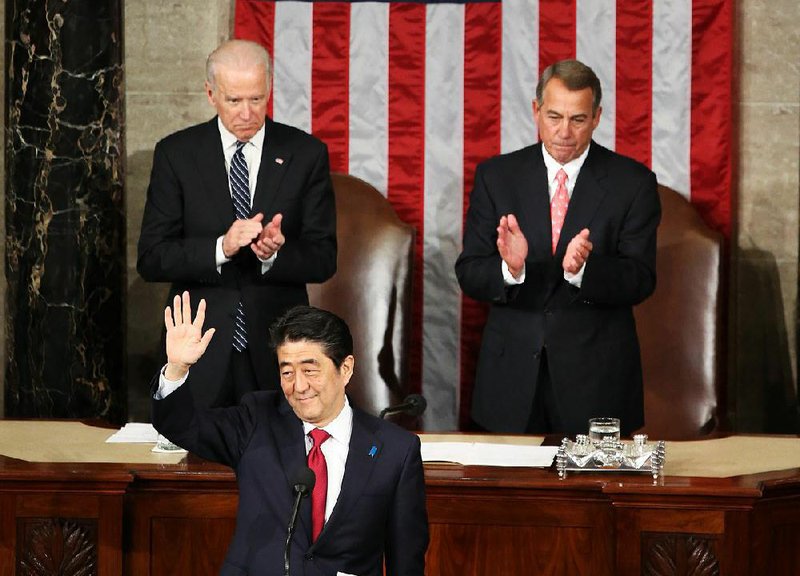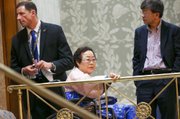WASHINGTON -- In a speech to the U.S. Congress on Wednesday, Japanese Prime Minister Shinzo Abe celebrated the evolution of ties with the United States since his nation's defeat in World War II and urged lawmakers to seal a groundbreaking Asia-Pacific trade deal.
Abe's address to a joint meeting of Congress was the first by a Japanese head of state.
"My dear friends, on behalf of Japan and the Japanese people, I offer with profound respect my eternal condolences to the souls of all American people that were lost during World War II," he said. He also highlighted what he called his country's aim to make a "proactive contribution to peace."
Before the address, he laid a wreath at the National World War II Memorial, which honors the more than 400,000 American service members who died in the conflict.
Japan is "resolved to take yet more responsibility for the peace and stability in the world," Abe said. "Let the two of us, America and Japan, join our hands and do our best to make the world a better, a much better place to live."
Since winning election in December 2012, Abe has been a strong advocate of closer ties with the U.S., a message he hammered home Wednesday. He vowed to enact legislation by this summer to facilitate closer cooperation with the U.S. military, in support of new U.S.-Japan defense guidelines endorsed Tuesday by Abe and President Barack Obama.
Abe said the U.S. and Japan "must take the lead" in completing a 12-nation trans-Pacific trade pact. That got a lukewarm response from Democrats but warm applause from Republicans -- reflecting the division in Congress on the issue.
Abe arrived in Washington as a battle brews over legislation that would give Obama the authority to negotiate the Trans-Pacific Partnership, a cornerstone of his second-term agenda. In a reversal of politics-as-usual, it's Obama's Democratic base that opposes him, and Republicans who support the deal.
Abe has taken some political hits of his own at home for pushing the trade pact and for loosening the restrictions of Japan's pacifist constitution to open the way for Japan's military to take a more active supporting role to the United States, which has nearly 50,000 troops based there.
While highlighting his country as a close ally of the U.S., he skirted another issue that some U.S. lawmakers had been urging him to address in what is the 70th anniversary of the end of the war: the sexual slavery of tens of thousands of Asian women by Japan's military, which remains a sore point with another staunch U.S. ally, South Korea.
Abe offered no new apology to the women from Korea and other nations who were forced into prostitution. He instead expressed "deep remorse" for unspecified suffering caused by his nation's wartime actions, from which the Japanese "must not avert our eyes."
Abe, 60, said Japan's war-era military "brought suffering to the peoples in Asian countries" and that he "will uphold the views expressed by the previous prime ministers in this regard."
One former "comfort woman," Lee Yong Soo, attended Abe's speech as a guest of Rep. Mike Honda, D-Calif.
"There's not many of us left, and he can wait for us to die out, but that won't erase Japan's crimes," Lee, 86, said before the speech, sitting in a wheelchair in front of the Capitol. She said she was forced into sexual slavery at age 16.
Honda said it was "shocking and shameful" that Abe was evading his government's responsibility over atrocities committed against the women.
Hundreds of Korean-American protesters from Maryland, Virginia and New York flanked Lee, chanting "apologize, apologize, apologize."
Trade-deal push
Abe began his 43-minute address by sharing his experiences of living in the U.S. as a student at the University of Southern California.
He recalled his appreciation of his host family's Italian cooking and joked about American mispronunciations of his name, winning applause and laughter from the audience. But aside from the pleasantries, the speech gave Abe an important opportunity to pitch reluctant lawmakers on the trade deal.
"The [Trans-Pacific Partnership] goes far beyond just economic benefits. It is also about our security. Long term, its strategic value is awesome. We should never forget that," Abe said.
He said Japan had undertaken "sweeping reforms" of its agriculture sector, to address U.S. concern about the industry's decades-long reluctance to open its markets. He invited Congress to visit the "new Japan" and witness changes made to "old habits."
"Japan's agriculture is at a crossroads," he said. "In order for it to survive, it has to change now."
U.S. and Japanese negotiators working on an initial trade deal between the two countries, intended as a foundation for the broader accord, are stuck on issues of agriculture and automobiles. U.S. farmers want lower Japanese duties on pork, dairy products and rice, while Japan wants a 2.5 percent tariff on cars exported to America to be eliminated.
Lawmakers "are pretty well-positioned" on the trade deal, Sen. Ben Cardin of Maryland, the top Democrat on the Foreign Relations Committee, said. "But a few changed minds can make a difference."
Reps. Raul Grijalva, D-Ariz., and Keith Ellison, D-Minn., co-chairmen of a caucus of liberal lawmakers, did not appear to be swayed. The trade deal must include "enforceable protections against currency manipulators," including Japan, they said in a statement.
"If the administration wants the U.S. to lead good trade deals, we must include rules to stop Japan and other countries from inflating the value of the dollar," they said.
Abe argued that the pact would result in an economic market that is "fair, dynamic, sustainable, and is also free from the arbitrary intentions of any nation."
"We must turn the area into a region of lasting peace and prosperity," he said. "That is for the sake of our children and our children's children."
On Tuesday, Abe and Obama said at a White House news conference that the trade deal represents no threat to China, the world's second-largest economy, which is excluded from the agreement.
Abe wrapped up his remarks Wednesday by adapting lyrics from a Carole King song he listened to on the radio in high school.
"Yes, we've got a friend in you," he told the lawmakers.
Information for this article was contributed by Billy House, Sangwon Yoon and Toluse Olorunnipa of Bloomberg News and by Matthew Pennington and Erica Werner of The Associated Press.
A Section on 04/30/2015

